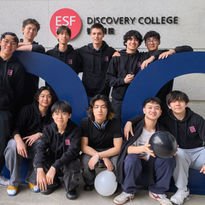Senior School Prospectus.
2026-2028
Core
Creativity, Activity and Service (CAS)
CAS is a framework for experiential learning, designed to involve students in new and meaningful roles. The emphasis is on learning by doing real tasks that have real consequences, and then reflecting on these experiences over time. The purpose is for students to be involved in experiences that will make a significant difference to their lives and to the lives of others, as well as challenge students to participate in experiences that they would not normally do.
All Diploma students at Discovery College must participate in CAS. While students may get involved in school-based experiences as a part of their programme, a large part of fulfilling CAS requirements will involve them undertaking experiences, on their own initiative or with community groups, outside of school. Students are responsible for conducting their own risk assessments for experiences not organised by the school.
CAS neatly reflects our school philosophy: it challenges students to Grow, building self-esteem, self-confidence, autonomy and self-reliance; it requires them to Discover about themselves, others, and communities on a local and global scale; and it encourages them to Dream to be an agent of change. When carried out well, CAS should also lead to the development of the attributes of the IB Learner Profile.
IB Diploma students are required to be regularly involved in CAS, ideally weekly, over at least an 18-month period. The CAS stages provide a framework for students to follow in their researching, planning and then doing activities and projects, with on-going reflection an essential key to reaching the programme’s objectives.
Showing evidence in the seven CAS Learning Outcomes is an integral part of successfully completing the programme. Other requirements include being involved in at least one large-scale project, and at least one experience that involves addressing an issue of public importance. It is recommended that no more than ten substantial experiences are conducted over the two-year CAS programme. On average, students should aim to spend approximately two to three hours per week participating in CAS experiences, with a reasonable balance between the three areas of CAS - Creativity, Activity and Service.
Creativity
This aspect of CAS covers a wide range of arts and other experiences outside the normal curriculum that include creative thinking in the design and carrying out of service projects. This can involve traditional arts experiences, but could also include experiences that involve creative thinking in their creation and implementation, such as organising an event or competition, developing proposals, and designing lessons.
Example activities include:
Photography, Tournament Organisation, Event Management, Website Development, Choir, Speech and Debate, Drama Production, Journalism, Model United Nations, Music, Band, Learning an Instrument, Community Development, Web-page Design.
Activity
This aspect of CAS can include participation in sport or other recreational activities that involve physical exertion contributing to a healthy lifestyle. Students should be encouraged towards group and team experiences and undertaking new roles, but an individual commitment is acceptable where the general requirements of CAS are met: goals are set and the student reflects on progress.
Example activities include:
Aerobics, Badminton, Basketball, Swimming, Kickboxing, Triathlon, Hiking, Rock Climbing, Personal Training Programmes, Trekking, Tennis, Yoga.
Service
Service projects and experiences are often the most transformative element of the CAS Programme for the individual student; they have the potential to nurture and mould the global citizen.
Service involves interaction, such as the building of links with individuals or groups in the community. The community may be the school, the local district, or it may exist on national and international levels.
As CAS aims to extend the student, a student’s CAS programme should include experiences that sees them working beyond the school community. Collaborating with, as opposed to working for, members of a community provides the most positive Service experiences. To best address the differences in privilege that exist between the students who give service and those members of a community who are being served, a relationship of respect and mutuality should be established and promoted between these two groups. The best results for community development take place when a working relationship is created, where all parties are involved in the planning, implementation and evaluation of service activities.
Example activities include:
Teaching Computer Literacy, Developing a Waste Management Programme, Student Council, Peer Tutoring (to junior students), Establishing and Coaching a Sports Team, Working with Disadvantaged Youth, Event Management, Leading Arts and Crafts at an Elderly Home, Organising a Film Competition.










